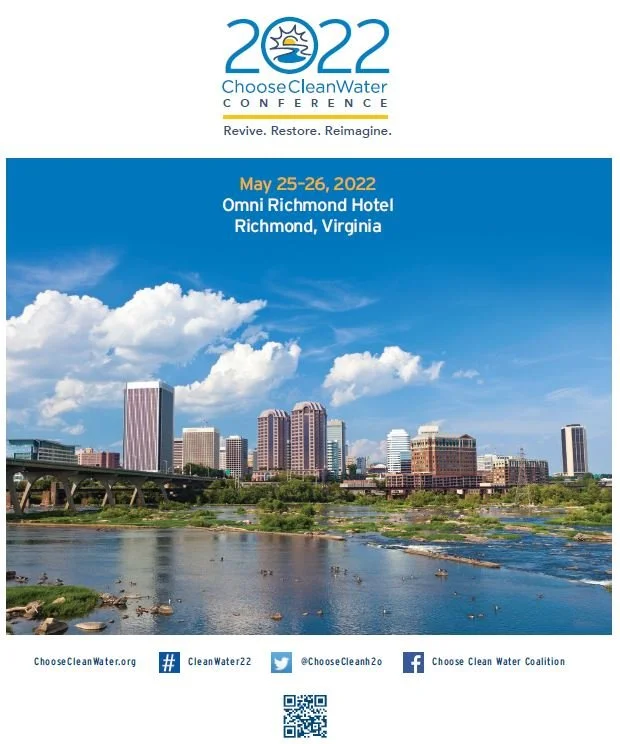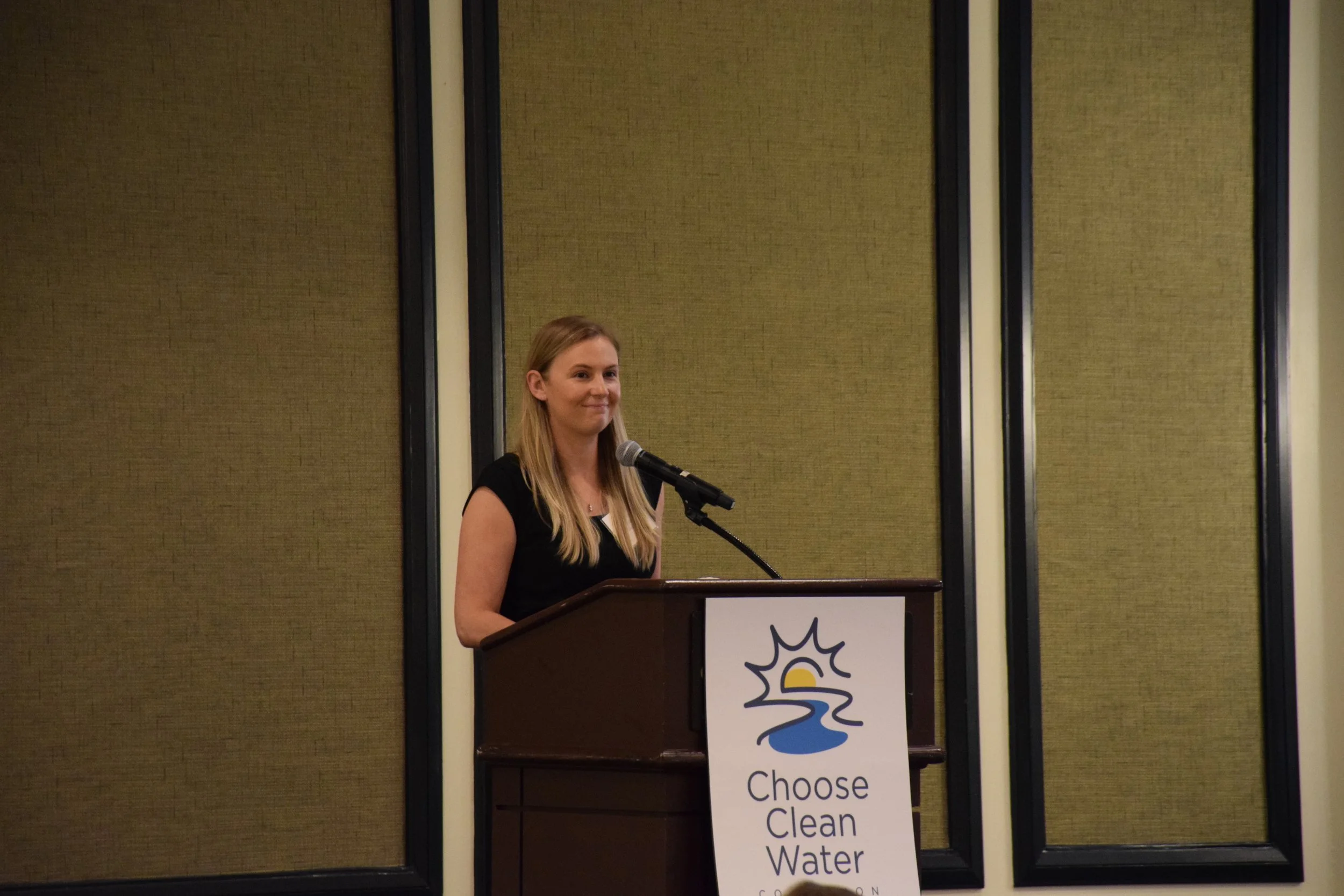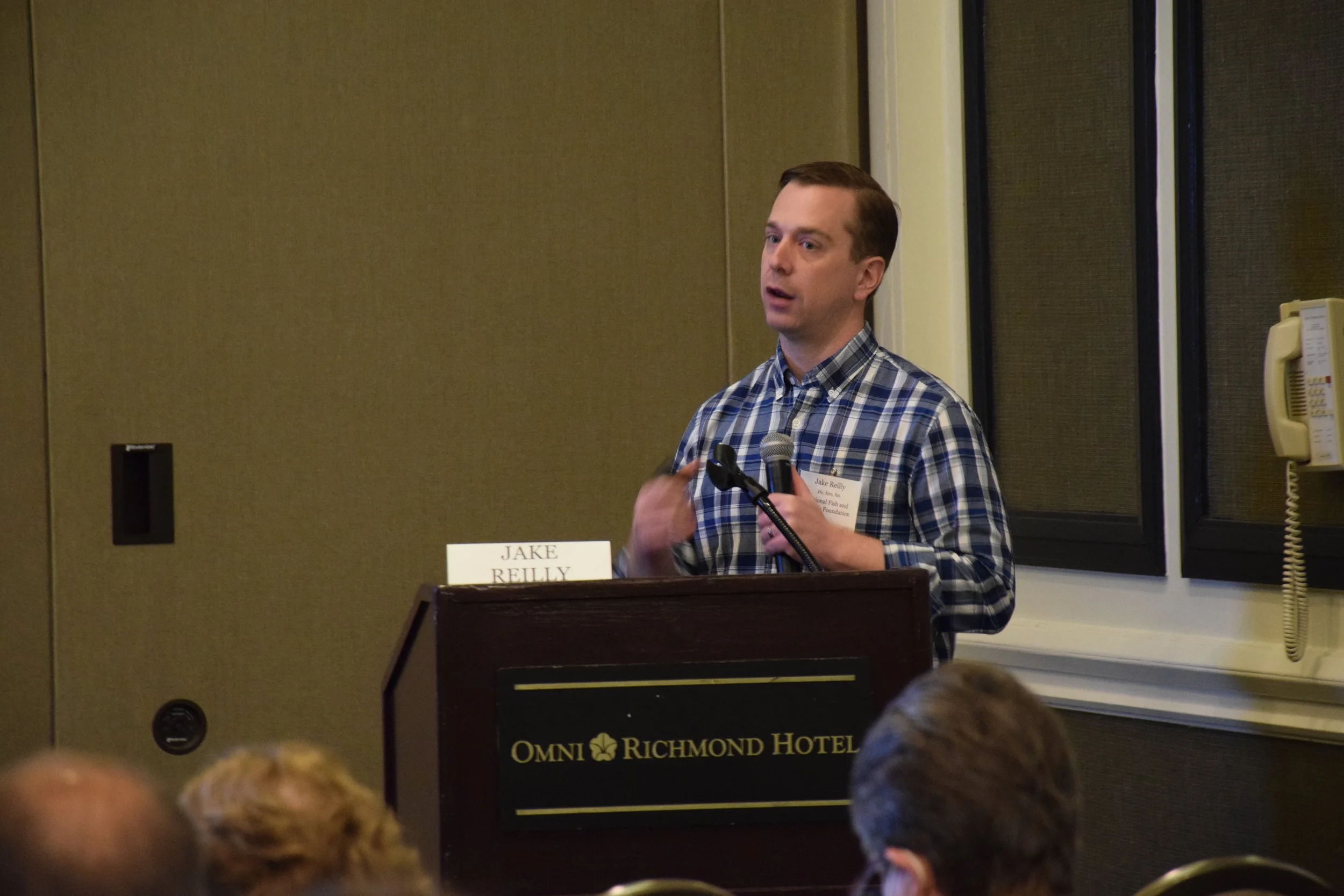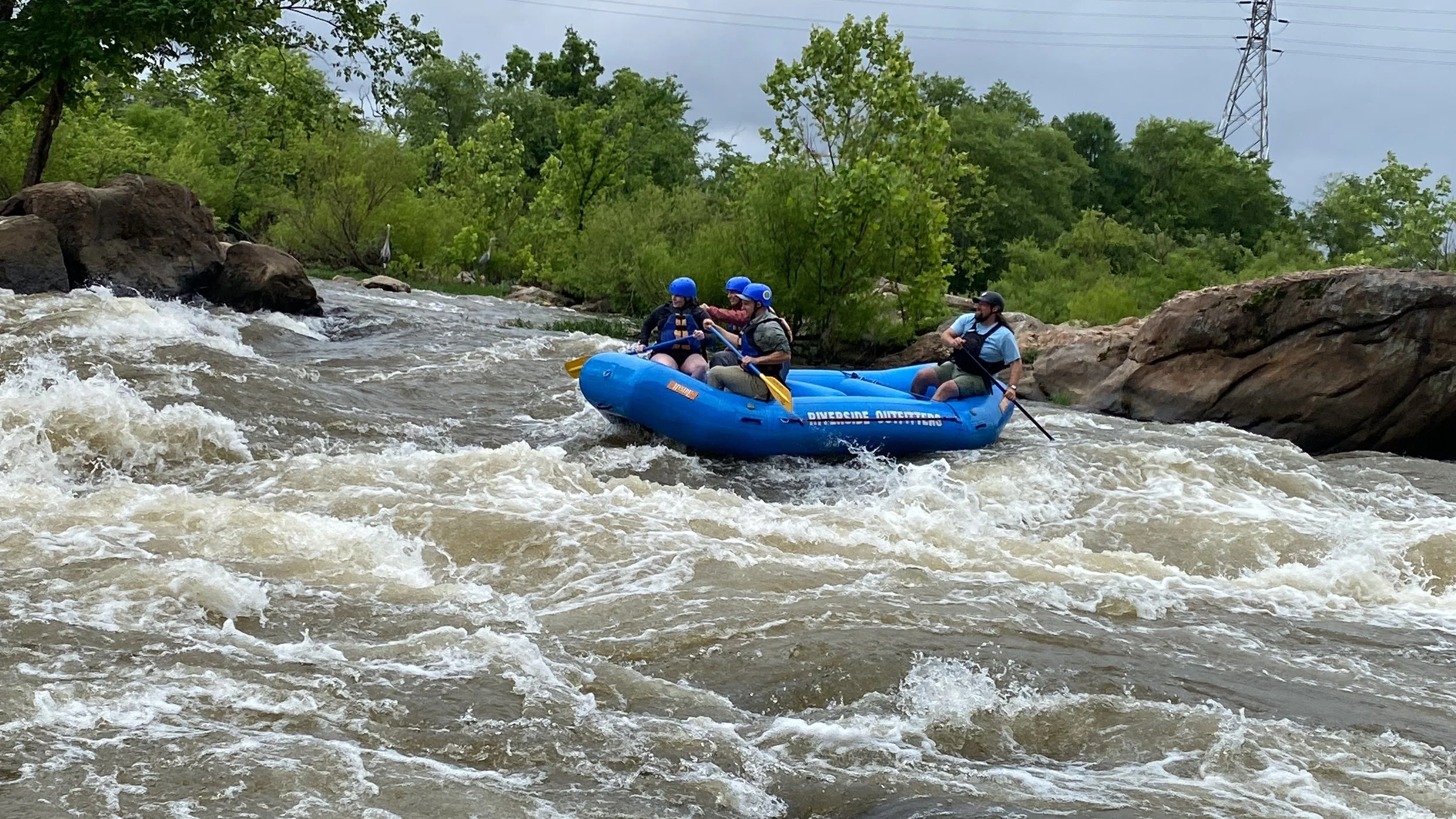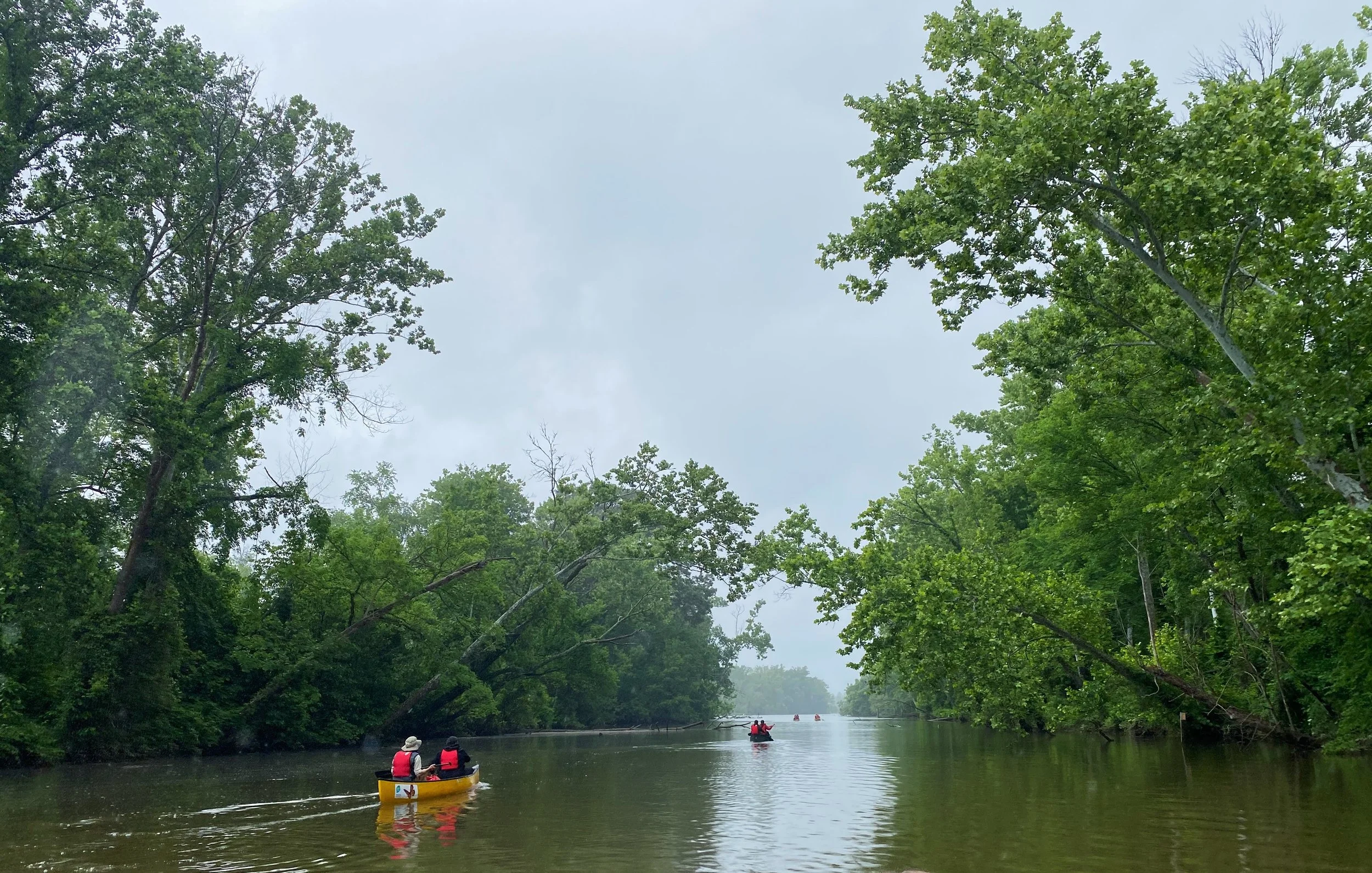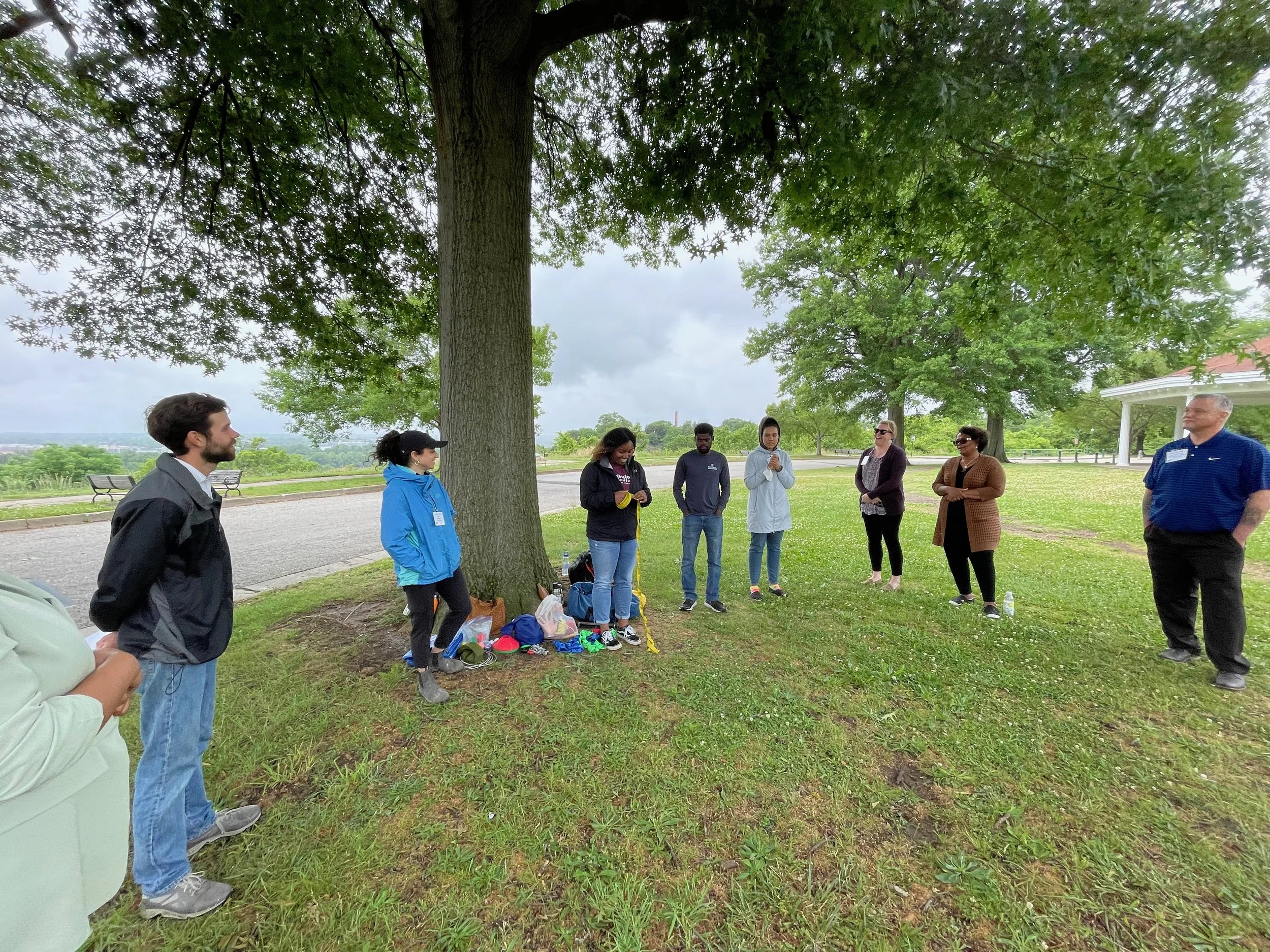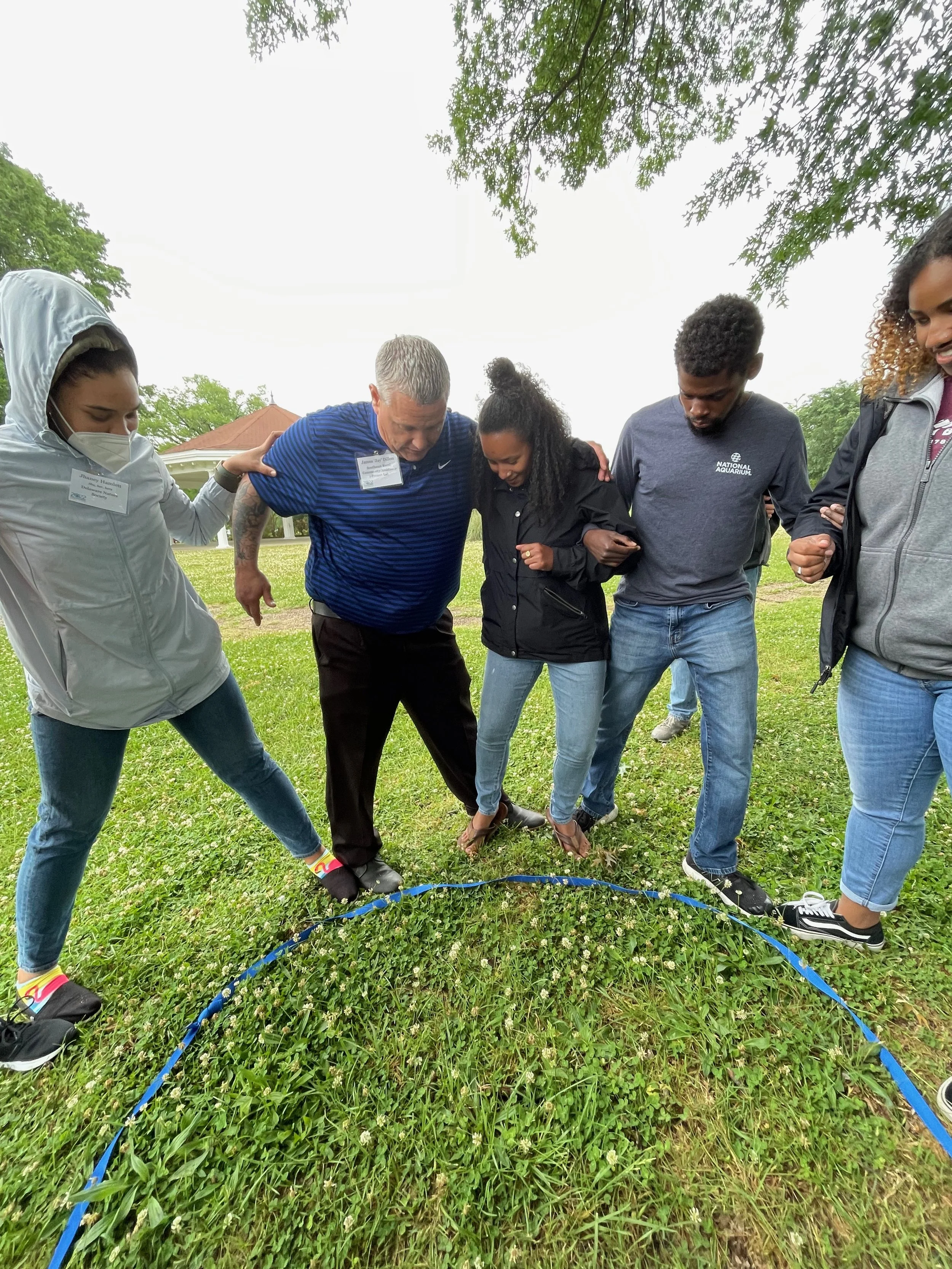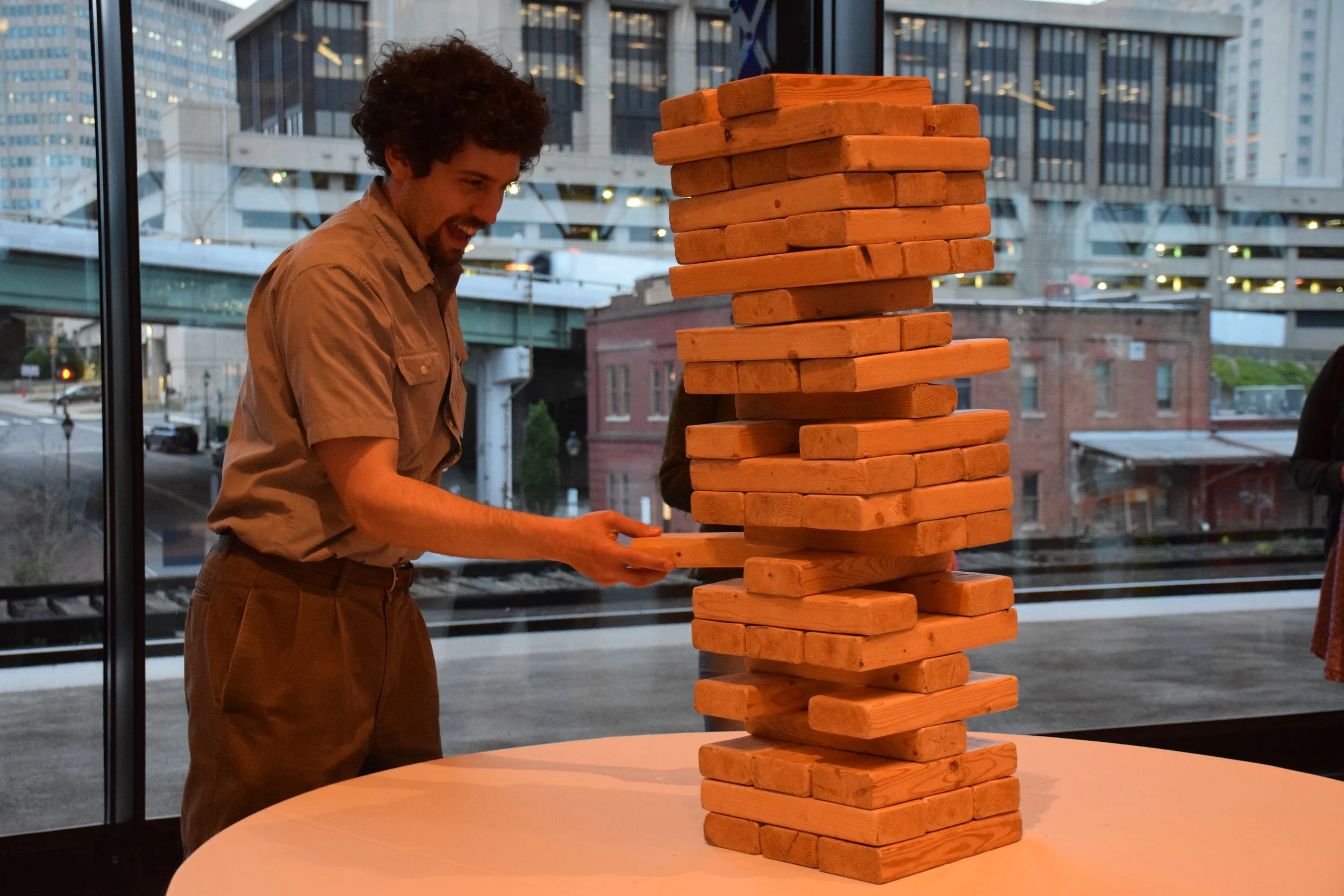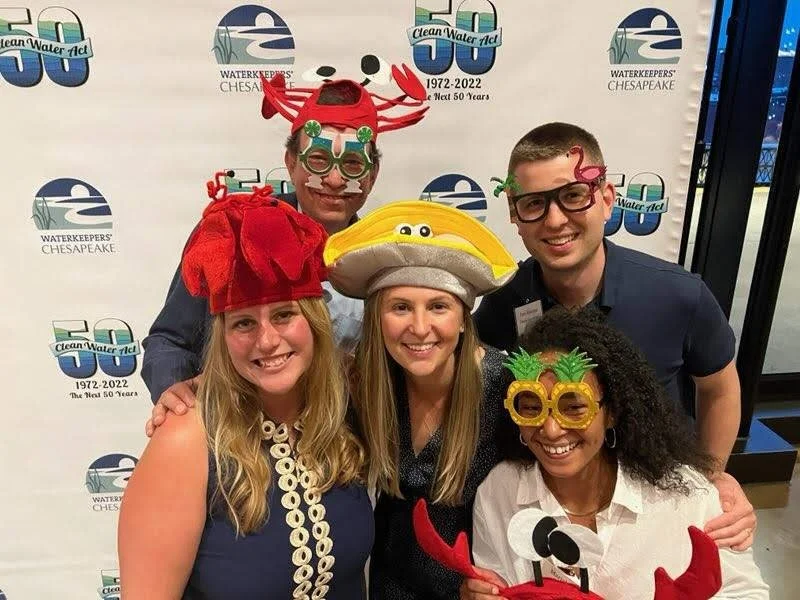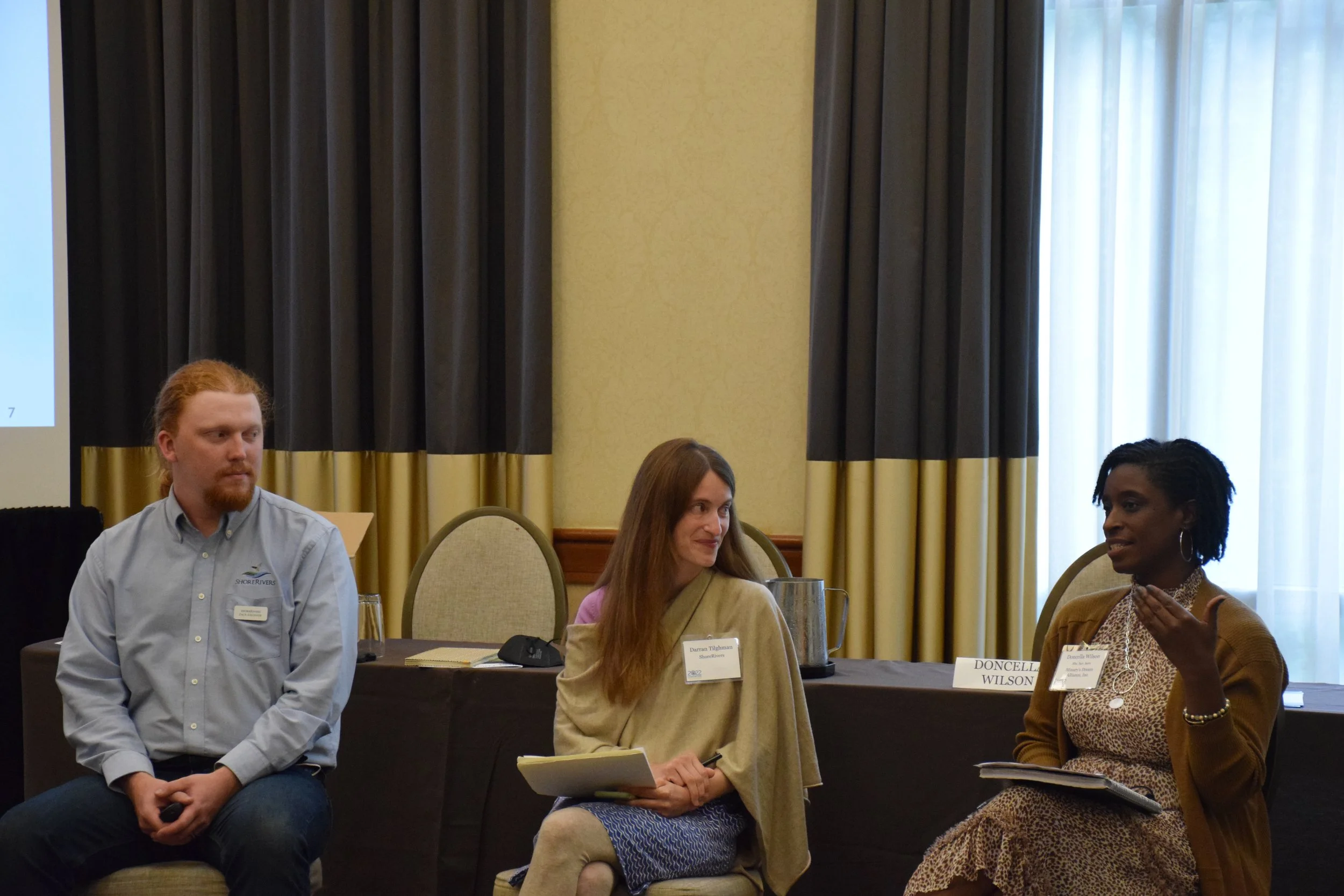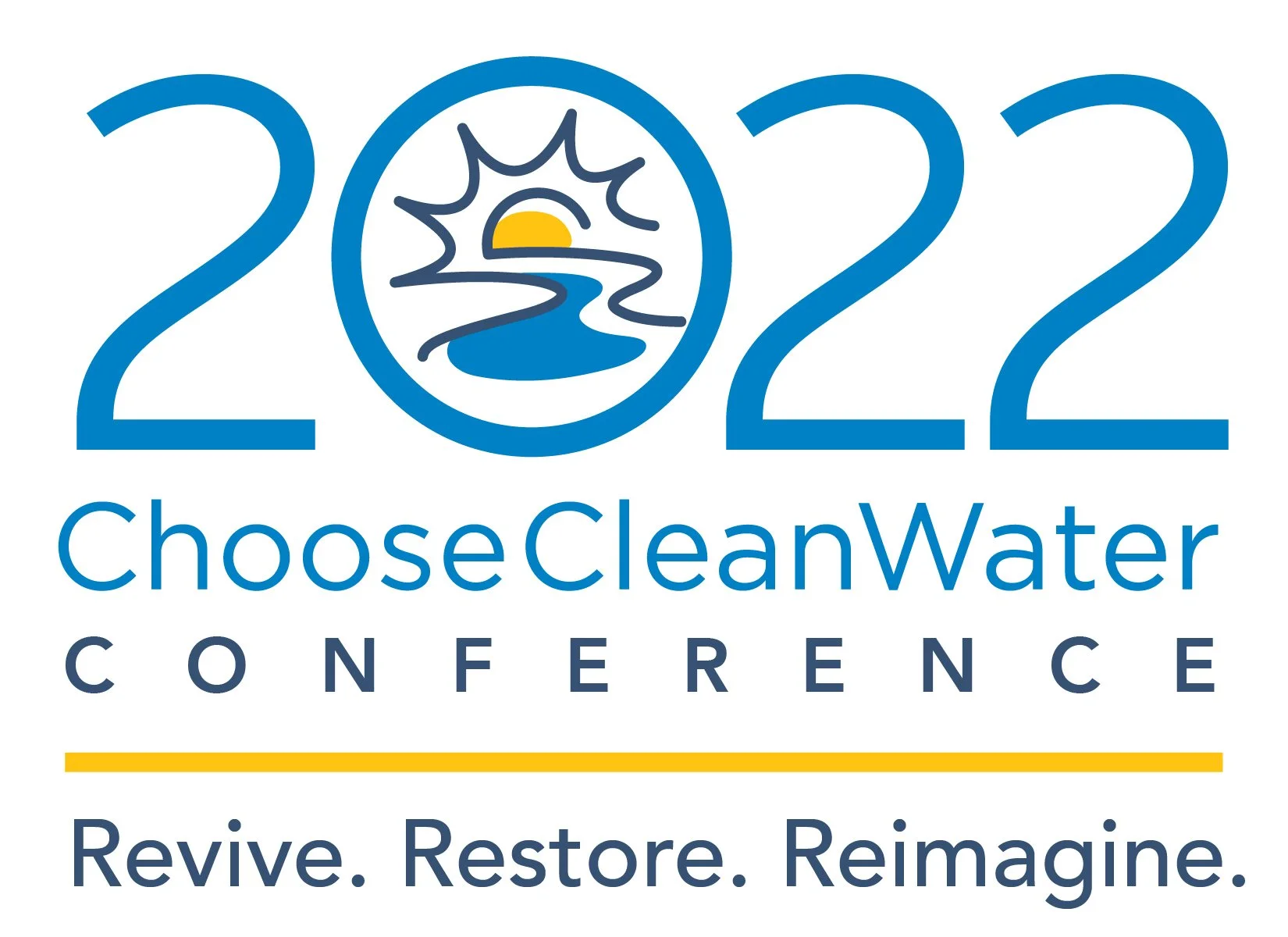2022 Choose Clean Water Conference Recap
Each year, the Coalition's Choose Clean Water Conference provides a two-day forum for participants to learn about the most important and up-to-date Chesapeake restoration issues, network with fellow Chesapeake Bay supporters and activists, develop strategies to advance federal, regional and local restoration goals, and learn from successes.
For our 2022 conference, we gathered in Richmond, Virginia, exploring the theme, Revive. Restore. Reimagine. Gathering for the first in-person Choose Clean Water Conference in three years, we were excited to revive the energy of our Coalition, strengthen our resolve to restore our waterways, and reimagine our movement. Throughout the COVID-19 pandemic, the members of the Coalition have demonstrated remarkable resilience in moving the Bay restoration effort forward despite unprecedented circumstances. This conference sought to not only reenergize our members by offering some much-needed face-time, but also provide a platform for discovering new tools and resources to meet our clean water goals and a space for reflection and inspiration as we seek to center our work on principles of equity and justice.
You can see our full conference program here or you can see below for the full agenda.
Full playlist of plenaries and recorded sessions are available:
Thank You to Our Sponsors!
The Choose Clean Water Conference is important to our Coalition members as it is an opportunity for participants to learn about innovative restoration approaches from experts, engage in discussions with other attendees from different parts of the watershed, and see on-the-ground examples of local work. But this gathering was not possible without sponsors partnering with us to provide a unique and powerful experience to attendees.
We are so grateful for the 2022 Choose Clean Water Conference Sponsors!
Chesapeake Sponsor - $20,000
James Sponsor - $10,000
Potomac Sponsor - $5,000
Shenandoah Sponsor - $2,500
Rappahannock Sponsor - $1,000
Alliance for the Chesapeake Bay
American Dairy Association North East
Audubon Naturalist Society
Campaign for Tobacco-Free Kids
Chesapeake Bay Program
Ducks Unlimited
The Hatcher Group
James River Association
Luck Ecosystems
OpinionWorks
PennFuture
Potomac Conservancy
Southern Environmental Law Center
SouthWings
Spitfire Strategies
University of Maryland Carey School of Law Environmental Law Program
Virginia Conservation Network
Virginia Environmental Endowment
Virginia League of Conservation Voters
Waterkeepers Chesapeake
York Sponsor - $500
Alliance for the Shenandoah Valley
Anacostia Watershed Society
Capital Region Land Conservancy
Chesapeake Bay Trust
Chesapeake Legal Alliance
Conservation Voters of Pennsylvania
Environmental Quality Resources, LLC
GreenSmith
The Hillsdale Fund
National Aquarium
Skeo Solutions
Trout Unlimited
Water Words That Work
West Virginia Rivers Coalition
Note: We livestreamed every item marked with three asterisks for our virtual attendees. This included our kickoff, two plenaries, and seven sessions.
Wednesday, May 25
8:00-9:00 Breakfast and Registration Opens
9:00-9:45 Welcome and Opening Plenary
***Welcome and Networking
Kristin Reilly, Director, Choose Clean Water Coalition
Mary Rafferty, Executive Director, Virginia Conservation Network
April Bingham, Director, City of Richmond Department of Public Utilities
Join us as we kickoff the 2022 Choose Clean Water Conference and take time to meet and reconnect with peers outside of our Hollywood squares!
10:00-11:45 Workshops and Sessions
10:00-11:45
Workshop: A Green Space Mapping Tool to Prioritize Green Spaces for Low Income, Communities of Color
Topic: Equity; Sub-topic: Campaigns
Bianca Boggs, Skeo Solutions
Amelia Lowe, Chesapeake Conservation Partnership
This interactive workshop will demonstrate a web‐based mapping tool created to assist the land conservation community prioritize green space conservation in low‐income communities of color. Funded under a grant from the EPA Bay Program, sponsored by the Chesapeake Bay Trust and guided by the Chesapeake Conservation Partnership, the map tool highlights communities with limited access to green space along with other factors such as demographics and flood risk. This workshop will provide an introduction and overview of the tool with time to provide suggestions and feedback on how to ensure the map tool will be a useful resource.
10:00-11:45
Workshop: The Future of Energy in the Bay
Topic: Campaigns; Sub-topics: Clean Water, Campaigns
Presenters forthcoming
The Coalition's Energy Workgroup (formerly known as Shale) may be lesser known to organizations involved in Chesapeake Bay restoration. As climate change continue to affect communities across the watershed, this workgroup serves an important role within our clean water work to protect public health, communities, and resources from the negative impacts of fossil fuel and related energy development. During this workshop, you will hear from experts within the workgroup on their work to-date from reclaiming abandoned mines, pipelines, and just energy transition. The workgroup will facilitate breakouts on a number of topic areas to help equip coalition members with advocacy tools from building financial support for campaigns to strengthening partnerships, storytelling, and utilizing legal tools to execute successful energy campaigns.
10:00-10:45
***Session: Advancing DEIJ Outcomes through NFWF's Chesapeake Bay Grantmaking
Topic: DEIJ; Sub-topic: Public Engagement
Jake Reilly, National Fish and Wildlife Foundation
Echoing a foundation-wide commitment to diversity, equity, inclusion, and justice in our conservation funding programs, the National Fish and Wildlife Foundation's Chesapeake Bay Stewardship Fund has undertaken new efforts and began deploying new tools to advance meaningful engagement of diverse communities through our Chesapeake Bay grant programs. In this session, you'll learn about key considerations and prospective directions as NFWF continues to reorient its Chesapeake Bay programs to enhanced DEIJ outcomes, as well as new tools developed by the foundation to understand the nature of communities impacted by our grant projects and the depth and quality of community engagement.
10:00-10:45
Session: Building a Collaborative Model for Regional Restoration
Topic: Campaigns; Sub-topic: Clean Water
Amber Ellis, James River Association
Sarah Coffey, Chesapeake Bay Foundation
Creating regional scale programs with partners is quite a challenge. This session will share some tips and tricks to develop regional scale programs that are simple, impactful, and built on trust. You will learn about the origins of the James River Buffer Program that is focused on restoring riparian forest buffers, the importance of having a collaborative network like the Upper and Middle James Riparian Consortium, and what makes an initiative accessible and easy for other partners to join and scale up for collective impact.
11:00-11:45
***Session: The Results Are In: Reviewing the Capacity of the Bay's NGO Community
Topic: Campaigns; Sub-topic: Clean Water
Jenny McGarvey, Alliance for the Chesapeake Bay
Lauren Sauder, Alliance for the Chesapeake Bay
Steve Raabe, OpinionWorks
Working in collaboration with respected research and strategy firm OpinionWorks, the Alliance for the Chesapeake Bay and the Choose Clean Water Coalition conducted a comprehensive assessment of the capacity levels of the Bay’s NGO community. From this assessment, we seek to build a strategic roadmap forward to help bridge and close the capacity gaps. Join this session to hear preliminary findings from the assessment and learn how you can get involved to increase the collective capacity of all organizations fighting for clean water throughout the Chesapeake Bay watershed.
11:00-11:45
Session: What's Up with the Ward 8 Water Watchers?
Topic: Public Engagement; Sub-topics: Campaigns, DEIJ
Jamoni Overby, Audubon Naturalist Society
Ronnie Webb, Green Scheme
A joint project of Audubon Naturalist Society and The Green Scheme, Ward 8 Water Watchers is now in its second year inviting the communities of Ward 8 in DC to come and explore Oxon Run. Learn how we collaborate with our partners DC Greens and Friends of Oxon Run to help people see water in their community from a new perspective through engaging watershed education programming, food, and fellowship. Anchored at The Well at Oxon Run, a new urban farm, the project is connecting the watershed and wellness by encouraging neighbors to see themselves as “Ward 8 Water Watchers” – now and into the future.
12:00-1:00 Lunch and Midday Plenary
***PANEL DISCUSSION: Fighting for Environmental Justice in the Old Dominion
Queen Shabazz, Virginia Environmental Justice Collaborative (Moderator)
La'Veesha Allen Rollins, Concerned Citizens of Charles County
Renada Harris, Brown Grove Preservation Group
Throughout Virginia, as developers, corporations, and energy conglomerates pursue projects with harmful environmental outcomes, they frequently target and adversely impact marginalized communities overburdened by pollution. These projects not only harm the environment but also come with severe consequences to local economies, public health, and quality of life. Hear the stories of activists from the Virginia Environmental Justice Collaborative as they describe the projected harm of proposed projects in their community and how they organized, empowered, and mobilized their community to fight back.
1:00-1:45 Sessions
1:00-1:45
Session: Reimagine: Engaging Regional Private Industry in Large Scale Reforestation
Topic: Campaigns; Sub-topic: Clean Water
Brenda Sieglitz, Chesapeake Bay Foundation
Molly Cheatum, Chesapeake Bay Foundation
Large scale reforestation and mass tree planting initiatives are flooding the news and not all of the news is positive. How can we plant trees in mass quantity with a high success and survival rate? The Keystone 10 Million Trees Partnership, a collaborative effort of more than 200 national, regional, state, and local agencies, conservation organizations, outdoor enthusiasts, businesses, and citizens are piloting systems to reimagine large scale reforestation. This session will explore the challenges and opportunities of working with private industry to scale up large scale reforestation at a regional level.
1:00-1:45
***Session: "A River Reborn" in Coal Country: Screening & Director Discussion
Topic: Clean Water; Sub-topic: Communications
Stephanie Wein, PennEnvironment
Ben Kalina, Filmmaker
PennEnvironment presents A River Reborn, a new 28-minute film about the remediation of acid mine drainage along the Little Conemaugh River. The film captures how we heal the legacy of mining waste in our rivers, increase access to clean water, and spur a new outdoor recreation economy in a region left behind by the decline of coal. Following the film, we will dive into Q&A with award-winning filmmaker Ben Kalina about making the film and the ways in which the dramatic revitalization of the Little Conemaugh can serve as a blueprint for other coal country conservation and reclamation efforts.
1:00-1:45
Session: Enhancing Water Quality by Protecting Farmland in the Rappahannock River Basin
Topic: Agriculture; Sub-topic: Campaigns
Peter Hujik, Piedmont Environmental Council
Maggi Blomstrom, Piedmont Environmental Council
Learn about a landscape-scale effort to conserve farmland and improve water quality through the development of new partnerships and use of under-utilized federal and state funding programs. Focused on the Rappahannock River Basin in Virginia, an under-conserved agricultural landscape that provides drinking water to the City of Fredericksburg and downstream communities, we will discuss how evolving federal requirements with NRCS's Agricultural Land Easement program and state funding support efforts to improve clean water by addressing related soil health issues. We will also touch upon our experience working with historically under-served producers. Our efforts demonstrate the need to increase funding to effectively conserve farmland and improve water quality throughout the Commonwealth.
1:00-1:45
Session: Engaging the Latino Community
Topic: DEIJ; Sub-topic: Public Engagement
Abel Olivo, Defensores de la Cuenca
This conference session will present Defensores de la Cuenca's work to engage Latinos and Spanish-speakers in watershed issues. In a discussion format, we will discuss the need and importance of engaging this community, factors to consider in outreach, and challenges and opportunities presented by partnering with this critical audience. We will also explore Defensores's La Academia as a model for meaningful engagement.
1:00-1:45
Session: Using Social Marketing to Improve Shoreline Management
Topic: Communications; Sub-topics: Public Engagement, Campaigns
Rachel Felver, Alliance for the Chesapeake Bay
An estimated 10 million people live along the more than 10,000 miles of tidal shoreline of the Chesapeake Bay. Shoreline degradation has a direct and negative impact on water quality, while natural shoreline protection provides more resilience against climate change. Learn how the Chesapeake Bay Program, with assistance from a contractor, conducted a community-based social marketing campaign to influence environmentally-sensitive actions relating to shoreline management. This session will review the project findings, share the toolkits created, and ask for assistance in helping identify the best methods to put this information into the hands of those who could use it.
2:30-5:30 Field Trips*
*Note the capacity for each trip! Seats are filled on a first-come, first-served basis.
James River Discovery Flight
With SouthWings, general aviation aircraft become flying classrooms. This field trip offers an educational flight excursion to uniquely illuminate the cumulative factors that either contribute to or undermine the health of the James River. A local resource expert will accompany each aircraft to lead discussions and lend expertise.
Paddle the James!
Hit the water with the James River Association and Capital Region Land Conservancy at Great Shiplock Park for a guided tour of Richmond’s riverfront by canoe. Participants will learn about the connection between land conservation and outdoor recreation with a focus on Richmond's beloved James River Park System. Recent efforts to expand the park system and improve accessibility will be discussed.
Whitewater Rafting on the James
Experience the James River in a new way! Few other sections of river combine adventurous whitewater and views of Bald Eagles or Great Blue Herons with sights of a bustling downtown. Participants should expect to get their feet wet and enjoy an adventure they are not likely to soon forget.
Tour Richmond's Wastewater Treatment Plant
Join us for a walk-through of Richmond's Wastewater Treatment Plant. We'll begin at the plant influent, journey through the 140 MGD treatment facility (including Richmond's Ultraviolet Disinfection Facilities!), and end at the treated effluent outfall into the James River. Closed-toed shoes and long pants are required on this walking tour.
Slowing the Flow in RVA
Polluted runoff is the fasting growing source of pollution to the Chesapeake Bay and its rivers and streams. But here in Richmond are some great examples of projects that reduce the stormwater onslaught while beautifying communities and providing vital services. Join the Alliance for the Chesapeake Bay and Chesapeake Bay Foundation for a tour of rain gardens, native plant labyrinths, and a community garden at local schools and churches.
YPC Team Building Activity
Are you a current or past member of the Coalition's Young Professionals of Color (YPC) Mentorship Program? If so, we invite you to participate in an engaging and fun series of customized problem solving and team building activities to connect with like-minded BIPOC professionals. This team building activity lead by Signature Team Building and Challenge Discovery is designed to push us out of our comfort zones, think differently, build self-awareness, and develop deeper relationships with one another.
Linear Garden Walking Tour
Join Capital Trees on a down and back, two-mile walking tour of our four major projects. With human and wildlife use and a sustainable ecosystem in mind, The Low Line has as much to admire above ground as it does below. Visitors to the gardens are met with a biodiverse plant palette, with an emphasis on native plants. Behind the scenes, these intentionally landscaped areas are hard at work reducing stormwater runoff through environmentally focused rain gardens and biofiltration systems. Participants should expect a two-hour walk and good walking shoes and sunscreen are encouraged. The tour will depart from and return back to the Omni Hotel and will include a small portion of downtown Richmond, the Canal Walk, and the Virginia Capital Trail.
6:15-10:00 Evening Reception
Join the Coalition at Main Street Station for our evening reception as we reconvene for the best clean water networking event of the year! The reception will feature delicious local fare from White House Catering, beer donated from Väsen Brewery and live music from Bellevue Rhythmaires.
Thursday, May 26
8:00-9:00 Breakfast and Registration Opens
9:00-9:45 Morning Plenary
NETWORKING: Choose Your Own Adventure
Yakking about fracking? Schmoozing about TMDL snoozing? Discussing about stream restoration fussing? Join us before the day gets started for a time of networking with breakfast roundtables where you can join an existing topic or create a new group.
10:00-11:45 Workshops and Sessions
10:00-11:45
Workshop: Developing Best Practices for Equitable Compensation
Topic: DEIJ
Mariah Davis, Choose Clean Water Coalition
Mary Rafferty, Virginia Conservation Network
More presenters forthcoming
As the environmental community prioritizes efforts to be more diverse, equitable, inclusive, and just, there is a growing need to tap experts in the region with the background and experience to help organizations meet these goals. As a result, BIPOC professionals are increasingly overburdened with requests outside of their job descriptions to give expert advice, join panels, committees, and produce more. Organizations who strive to center BIPOC voices in their work, also struggle to fairly compensate these experts for their time and value. In response to these needs within our community, the Coalition's Equity Workgroup in partnership with Virginia Conservation Network developed a draft set of best practices organizations and BIPOC professionals can use to justify equitable compensation. This guidance, Best Practices for Equitable Compensation, will be shared during this workshop for feedback and continued discussion.
10:00-10:45
Session: Clean Headwaters: In Search of Microplastics
Topic: Clean Water; Sub-topics: Public Engagement, Campaigns
Wendy Howard, One Montgomery Green
Concern is growing worldwide on the alarming volume of plastics in the oceans and freshwater bodies, including in the Chesapeake Bay watershed. In this session, One Montgomery Green (OMG) will discuss their educational program to increase awareness and understanding of the presence of plastics pollution in the marine environment and what we can do about it. The session will explore data collected by students in local streams and the results derived from lab analysis. Participants will leave with a greater understanding of how to operate a successful hands-on environmental education program and tools to recruit students and teachers.
10:00-10:45
Session: Activating Inclusive Restoration (with River-Friendly Yards)
Topic: Public Engagement; Sub-topics: Campaigns, Communications
Zack Kelleher, ShoreRivers
Darran Tilghman, ShoreRivers
Doncella Wilson, Minary’s Dream Alliance
ShoreRivers' River-Friendly Yards program works with local community members to take action on their own properties to improve local water quality and ecosystem health. There are a suite of practices that have tremendous impact, from planting native plants, to installing rain barrels, eliminating fertilizer use, and many others. Because of the accessibility of this program, it has rapidly grown to include residential properties, schools, churches, golf courses, and more. We will explore our successes and challenges from this program and how your organization can develop and implement an effective community outreach program.
10:00-10:45
Session: Clean Water Collaboration Wins in Richmond
Topic: Stormwater; Sub-topic: Campaigns
Bill Boston, City of Richmond
Nissa Dean, Alliance for the Chesapeake Bay
Join longstanding partners from the City of Richmond's Stormwater Utility and Alliance for the Chesapeake Bay for a journey through their evolving collaborative efforts while you're right here in town! From humble beginnings implementing green infrastructure on various types of City-owned properties (including public schools, libraries, parks, and green streets) to ambitious $1 million NFWF grant-funded efforts planning the future of green infrastructure in Richmond, learn how this government-NGO relationship has thrived and achieved success along the way.
10:00-10:45
***Session: Pennsylvania's WIP and Working with Plain Sect Farmers
Topic: Agriculture; Sub-topics: Campaigns, Public Engagement
Renee Reber, PennFuture
Mauricio Rosales, Alliance for the Chesapeake Bay
It is well known that Pennsylvania has a long way to go to meet its Total Maximum Daily Load (TMDL) goals. Fortunately, the state approached the Phase 3 Watershed Implementation Plan (WIP) through a stakeholder engagement process that has mobilized planning and implementation efforts through County Action Plans. In this presentation, we will examine Pennsylvania's progress and the hurdles towards meeting WIP goals. We will also explore the challenges and opportunities of working with farmers and Plain Sect communities in Lancaster County.
11:00-11:45
Session: A Tale of Three Buffers
Topic: Agriculture; Sub-topic: Campaigns
Kristen Hoke, Chesapeake Bay Foundation
Riparian forest buffers are one of the most effective practices for protecting and improving water quality. Yet implementing this important practice is challenging even when ample funding and incentives are available to streamside landowners. A Tale of Three Buffers will examine the successful implementation of two buffers and explore the challenges and opportunities of working with landowners in the agricultural community.
11:00-11:45
Session: It’s Not about Us: Reaching Voters in the COVID Era
Topic: Public Engagement; Sub-topic: Campaigns
Mike Town, Virginia League of Conservation Voters
Avohom ‘Vo’ Carpenter, Everybody Votes Campaign
With engaging in the electoral process critical in the fight for clean water, the Virginia League of Conservation Voters (VALCV) plays an important role in encouraging and equipping all Virginians to vote. But their programming and outreach were thrown a major curveball with the arrival of COVID-19. Learn how VALCV adapted to meet the needs of potential voters, built resilience in their programming, and made deeper connections with communities throughout Virginia. Attendees will leave with insight into the importance of their organization participating in the electoral process and skills to adapt to changing circumstances.
11:00-11:45
***Session: It Starts at Home: Certifying Residential Best Management Practices for TMDL Credit
Topic: Stormwater; Sub-topic: Public Engagement
Barbara Gavin, Elizabeth River Project
Mary Bennett, Elizabeth River Project
To meet our water quality goals, it's critical that homeowners implement projects that reduce the onslaught of polluted runoff into our waterways. Elizabeth River Project began implementing residential Best Management Practices (BMPs) for pollution reduction (nitrogen, phosphorus, and sediment) credit in 2014. These BMP projects range from rain gardens and lawn care plans to living shorelines and riparian buffer plantings. The Elizabeth River Project has created a re-verification process that is transferrable among organizations and localities working with property owners to cost share residential BMPs for pollution reduction credit. This session will review our BMP re-verification procedures in depth, diving into the data, tools used in the process, and highlighting opportunities to adapt to climate change as we design new residential BMPs.
11:00-11:45
Session: Fulfilling the Promise of the Clean Water Act on its 50th Anniversary
Topic: Campaigns; Sub-topic: Public Engagement
Betsy Nicholas, Waterkeepers Chesapeake
Robin Broder, Waterkeepers Chesapeake
The Clean Water Act 50th Anniversary Campaign celebrates the power and promise of this revolutionary law that provides rights directly to community members to enforce the law to protect their waterways. We are celebrating the tremendous achievements and reaching out to new communities to ensure that we set the agenda for the next 50 years of clean water instead of polluting industries. Want to join the campaign and celebration? Running through the anniversary on October 18 (and beyond), we are partnering with local, regional and national organizations, of every type, to host events, share success stories, and organize and advocate for clean water. This session will outline the goals and components of the campaign, and lead a discussion about how to ensure all voices are represented, especially those most impacted by water pollution. A key objective of the campaign is to lift up the voices of frontline communities to ensure that they have a seat at the table to set the clean water agenda for the next 50 years.
12:00-1:00 Lunch and Midday Plenary
***KEYNOTE: Adam Ortiz
With the U.S. Environmental Protection Agency playing a crucial role in the restoration of the rivers and streams that feed the Chesapeake Bay, Administrator Ortiz will discuss his experiences in politics and regulatory offices as a champion for clean water. Addressing issues of environmental justice, the impact of increasing polluted runoff, and excess nutrients from agriculture, he will share remarks on the challenges and opportunities of protecting and restoring local waterways across a region as large and diverse as the Chesapeake Bay watershed.
1:15-2:00 Sessions
1:15-2:00
Session: Tracking Success in Improving Access to Clean Water: the American Water Access Survey
Topic: Clean Water; Sub-topic: Campaigns
Alexandra Campbell-Ferrari, Center for Water Security and Cooperation
Luke Wilson, Center for Water Security and Cooperation
During this session the Center for Water Security and Cooperation will present the American Water Access Survey (AWAS), a standard-setting and benchmarking tool for identifying which communities experience the greatest risk of losing access to water and for tracking progress in advancing equitable, permanent gains to access to water and sanitation. We will explore the opportunities and challenges presented by this benchmark and provide a space for participants to discuss how the benchmark is a useful tool in our work for clean water. We will also discuss what criteria we should include in the benchmark to best capture what is necessary to deliver safe drinking water to our doorsteps.
1:15-2:00
Session: Funding Local Flood Resilience across Virginia
Topic: Stormwater
Grace Tucker, Environmental Defense Fund
Established in 2020, the Virginia Community Flood Preparedness Fund provides support for regions, localities, and tribes to reduce the impacts of flooding throughout the Commonwealth. In the first two grant rounds in 2021, the Department of Conservation and Recreation awarded more than $30 million to nearly 50 applications; an additional $40 million grant round closed in April 2022. This session will highlight some of the most innovative awards that build capacity for rural and low-income communities, incorporate natural infrastructure, address systemic inequities, build unique partnerships, and provide additional co-benefits for people and wildlife.
1:15-2:00
Session: Visual Storytelling: Using Photography for Impact
Topic: Communications
Will Parson, Alliance for the Chesapeake Bay
How does photography work? This session covers the basics of visual storytelling, providing a framework for understanding photography's role at the highest level. It is intended for anyone who uses photography in communications, regardless of whether they ever pick up a camera. Topics will include the elements of successful photography, how photos work with text, industry standards for ethical photography, and effective strategies for image selection and creating visual interest. The lessons are underpinned by research from sources such as the Poynter Institute and Climate Visuals and will use real-life examples drawn from the archives of the Chesapeake Bay Program.
1:15-2:00
Session: Greening Southside Richmond
Topic: DEIJ; Sub-topics: Campaigns, Clean Water
Gabby Troutman, Chesapeake Bay Foundation
Amy Wentz, Southside ReLeaf
In the first half of the 20th century, Richmond and cities across the U.S. were rife with “redlining”– a discriminatory lending practice that effectively denied mortgages and other investments in predominantly African American neighborhoods. One enduring legacy of this practice is more heat-absorbing concrete and asphalt and fewer trees. Learn about CBF's experience working alongside Southside ReLeaf and a coalition of community partners to combat the resulting health disparities in communities of color, by planting hundreds of trees, training local youth for green jobs, transforming asphalt into green space, and cooling some of the hottest neighborhoods in Richmond.
1:15-2:00
***Session: Purpose Park: Conservation Landscaping with Teens
Lisa Renee Jennings, Chesapeake Bay Foundation
Beginning in January of 2021, CBF worked alongside Teens with A Purpose, a youth engagement movement to plant 13 native trees and install a 1,200-square foot rain garden. Located in Purpose Park, a parking lot reimagined into a safe community space, the project was developed in collaboration with the City of Norfolk's Stormwater department and Virginia Tech's Agricultural Experiment Station. Persevering despite difficult conditions, the presentation will dive into the logistics, joys, and challenges of planning and implementing a tree planting and rain garden in an urban public housing area.
2:15-3:00 Sessions
2:15-3:00
***Session: Agroforestry: Trees, Profits, and Clean Water
Topic: Agriculture; Sub-topic: Clean Water
Audrey Epp Schmidt, Propagate
Bringing the forest to the field, agroforestry is the strategic integration of fruit, nut, and timber crops into existing agricultural operations. We will share case studies of how Propagate is piloting innovative agroforestry systems that measurably benefit ecological outcomes (e.g. water quality and soil health) while also achieving farmer goals for production and income. Agroforestry has the potential to “unlock” the adoption of conservation practices on additional acreage by speaking to farmers' bottom line. We will share case studies how we are advancing 'extreme buffers' that couple traditional riparian buffers with commercial agroforestry cropping systems. With the Chesapeake Bay watershed well-suited for agroforestry, we will share the nuances and considerations when designing, installing, and operating perennial cropping systems.
2:15-3:00
Session: Reviving Environmental Education in the Upper Bay Watershed
Topic: Campaigns
Jeff O'Handley, Otsego County Conservation Association
Otsego County Conservation Association is reviving Meaningful Watershed Educational Experiences (MWEEs) in New York through the Chesapeake Bay Headwaters Educational Ecosystem. This three-year, cooperative project with NOAA will increase environmental literacy through development and implementation of MWEEs in schools in New York's portion of the watershed. Why did our small organization tackle such a big project? How did the structure of our program allow us to adapt quickly to COVID-imposed restrictions? How was our first summer institute? We will answer these questions and examine the challenges of linking teachers and students to an ecosystem that is hundreds of miles away.
2:15-3:00
Session: Drinking Water Health on the Eastern Shore
Topic: Clean Water; Sub-topic: Public Engagement
James 'Jay' Dillon, Southeast Rural Community Assistance Project
Amanda Giorgio, Southeast Rural Community Assistance Project
For people living on the Eastern Shore, healthy drinking water isn't a given. Sea water is rising beneath their feet, narrowing the possibilities for safe wastewater treatment and limiting the amount of uncontaminated groundwater. SERCAP is working to keep the Eastern Shore a place where people can live sustainably. In this session, we will share stories of our work to address the drinking water quandary and we will ask audience members to help us imagine a vibrant future where every Virginian has access to clean water.
2:15-3:00
Session: Applying Community-Based Monitoring Approaches to Restoration
Topic: Public Engagement; Sub-topic: Clean Water
Liz Chudoba, Alliance for the Chesapeake Bay
Julie Vastine, Alliance for Aquatic Resource Monitoring
The goal of the Chesapeake Monitoring Cooperative (CMC) is to create a community where all data of known quality are used to inform watershed management decisions and restoration efforts at all levels. Over the past year, the CMC and the National Fish and Wildlife Foundation (NFWF) have worked together to develop a monitoring protocol that engages community volunteers to collect biological, chemical, physical, and visual indicators to evaluate the effectiveness of restoration projects and water quality impacts. This presentation will review the current practices, indicators, and data quality objectives identified during the study design process and methods testing phase.
2:15-3:00
Session: Will You Be Ready to Take a Stand?
Topic: Campaigns
Molly Brown, Chesapeake Legal Alliance
Angela Haren, Chesapeake Legal Alliance
The Clean Water Act (CWA) is a powerful tool your organization can utilize to restore local water quality. But when you need it, will you be prepared to use it? As we celebrate the 50th anniversary of this landmark legislation, this presentation will take the mystery out of the CWA, what it is, and how to use it to enforce pollution laws. Attendees will learn how their organizational by-laws, membership rules, website and fundraising language, and more, affect their right to sue under the CWA. Are you ready to take a stand? Let's find out.


